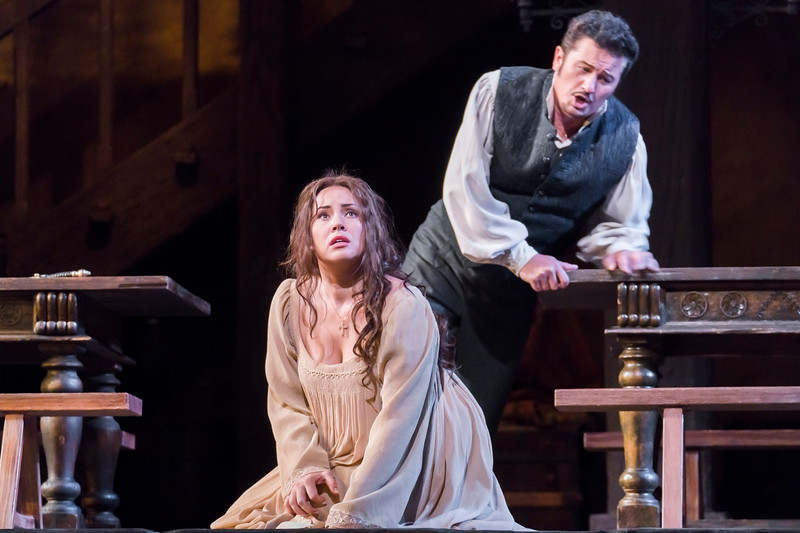Luisa Miller at the Met
Luisa Miller is one of the more satisfying transitional operas in Giuseppe Verdi’s long trajectory toward his late grand masterpieces. In addition to being more consistent in style and mood than early works, such as Nabucco and I Lombardi, it has more emotional depth, more soul than those operas in the years before Rigoletto, save, of course, Macbeth. One hears in Luisa Miller brief sound bites, teasers of things to come in Simon Boccanegra, La Forza del Destino, even Aïda.*
A recurrent theme in Verdi’s operas is the father-child relationship, a little more often father-daughter than father-son. Here Miller’s daughter Luisa is in love with “Carlo,” who is in reality Rodolfo, the son of Count Walter. The Count wants his son to marry Federica, a widowed duchess. The Count has Miller imprisoned. Wurm, a real worm, also a villain and by day Count Walter’s retainer, pressures Luisa to write a letter forswearing Rodolfo, admitting she’s au fond just a gold digger, and claiming that she loves Wurm instead, all this if she ever wants her father to leave prison alive.
Luisa Miller (Sonya Yoncheva) and 'Carlo,' the Count's son Rodolfo (Piotr Beczała) in disguise
She does so. Rodolfo, letter revealed, is distraught, so he takes poison and offers her some; dying, she reveals Wurm’s treachery and swears her devotion to Rodolfo. The latter stabs Wurm in his ebbing strength. Both young lovers die in the presence of their fathers.
Luisa Miller (Sonya Yoncheva) and Rodolfo (Piotr Beczała) have taken poison in Act III
The Met’s cast for Luisa Miller is strong from top to bottom. Sonya Yoncheva, in this her third HD telecast of the season, is a very fine Luisa. Her voice soars to the top, but remains rich on the bottom. The role of Luisa is a challenge, at times requiring spinto metal in contrast to airy coloratura. From her lighter opening scene in Act I to her ever darkening situations in the later scenes, Luisa Miller is a multifaceted character. Her dramatic aria in the first scene of Act II Tu puniscimi, o Signore is a case in point. It’s been Yoncheva’s season, certainly. Brava!
Rodolfo, aka Carlo, also has a wide range of emotions throughout the drama. The role fits Piotr Beczała like a glove: he is soulfully passionate throughout. His aria Quando le sere al placido, later in Act II, probably the best known excerpt from the opera, is another highlight of the evening. Bravo Beczała!
Miller (Placido Domingo) and Luisa (Sonya Yoncheva) in the village
Like Simon Boccanegra, Luisa Miller has three dark voices, which, with a darker orchestral sound and the dark sets, make for a fitting end to a cold gray winter this year. Miller is the latest of Plácido Domingo’s forays into the baritone repertory. He does not disappoint, well deserving of the ovation he received at the performance’s final curtain. Wurm is taken by Dmitry Belosselskiy, a fine singer performing a repulsive character. Lastly Alexander Vinogradov essays Count Walter. These are unformly robust performances and fine singing.
Duchess Federica is solidly sung by Olesya Petrova; Laura, Luisa’s young friend, is taken by Rihab Chaieb.
Bertrand de Billy conducts the Metropolitan Opera Orchestra with fire and elegance; the Metropolitan Opera Chorus complements the cast.
Village set for Luisa Miller, Act I
Elijah Moshinsky’s production relocates and updates the plot from the Tyrol in the 1600s to industrial England in the 1850s, happily taking advantage of the chance to enhance the claustrophobic atmospheres a tiny village and a dark estate. Santo Loquasto’s sets and costumes and Duane Schuler’s lighting work well to convey the peoples’ plight.
This production of Verdi’s Luisa Miller was new in 2001-2002. Welcome back! Don’t miss it.
*This is not to say keep your ears open for a tune from the Triumphal Scene…
Reviewed performance: April 9, 2018, looking for sun...
Photos: Chris Lee.
Ciao, J.



